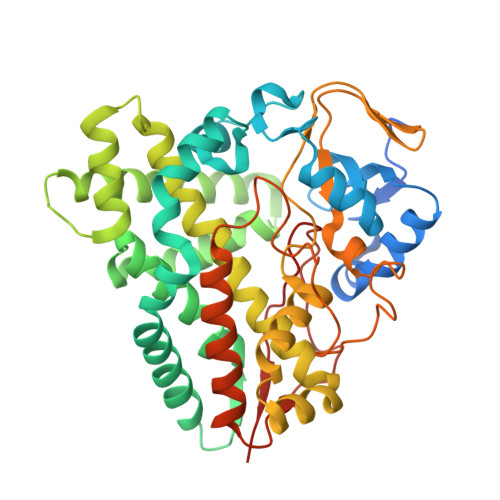Directing Group-Controlled Regioselectivity in an Enzymatic C-H Bond Oxygenation.
Negretti, S., Narayan, A.R.H., Chiou, K.C., Kells, P.M., Stachowski, J.L., Hansen, D.A., Podust, L.M., Montgomery, J., Sherman, D.H.(2014) J Am Chem Soc 136: 4901
- PubMed: 24627965
- DOI: https://doi.org/10.1021/ja5016052
- Primary Citation of Related Structures:
3ZK5, 4B7S - PubMed Abstract:
Highly regioselective remote hydroxylation of a natural product scaffold is demonstrated by exploiting the anchoring mechanism of the biosynthetic P450 monooxygenase PikCD50N-RhFRED. Previous studies have revealed structural and biochemical evidence for the role of a salt bridge between the desosamine N,N-dimethylamino functionality of the natural substrate YC-17 and carboxylate residues within the active site of the enzyme, and selectivity in subsequent C-H bond functionalization. In the present study, a substrate-engineering approach was conducted that involves replacing desosamine with varied synthetic N,N-dimethylamino anchoring groups. We then determined their ability to mediate enzymatic total turnover numbers approaching or exceeding that of the natural sugar, while enabling ready introduction and removal of these amino anchoring groups from the substrate. The data establish that the size, stereochemistry, and rigidity of the anchoring group influence the regioselectivity of enzymatic hydroxylation. The natural anchoring group desosamine affords a 1:1 mixture of regioisomers, while synthetic anchors shift YC-17 analogue C-10/C-12 hydroxylation from 20:1 to 1:4. The work demonstrates the utility of substrate engineering as an orthogonal approach to protein engineering for modulation of regioselective C-H functionalization in biocatalysis.
Organizational Affiliation:
Department of Medicinal Chemistry, §Life Sciences Institute, ⊥Department of Chemistry, and ∥Department of Microbiology & Immunology, University of Michigan , Ann Arbor, Michigan 48109, United States.
















